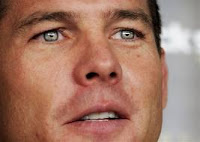Many have been just as troubled morally & spiritually as you are right now. Happily,some of them kept records of their troubles. You'll learn from them-if you want to. Someday, if you have something to offer, someone will learn from you. It's a beautiful reciprocal arrangement. And it isn't education. It's history. It's poetry. - J.D. Salinger, The Catcher in The Rye
Saturday, November 22, 2008
One man's drug is another's cash cow
One man's drug is another's cash cow
* Tracee Hutchison
* November 22, 2008
THERE is something ironic about the St Kilda footy club shaping up as one of Ben Cousins' last chances to resurrect his AFL career. A former bad-boy club, St Kilda is certainly no stranger to the wayward behaviour of troubled stars, but in recent years it has worked hard to turn around its tarnished image and this week the St Kilda board — not the football department — will decide if Cousins is a risk worth taking to boost its odds for a premiership.
St Kilda, like many AFL clubs, had a problem with alcohol. Some still do. And many, like the AFL itself, receive substantial sponsorship from advertising the product. The AFL is sponsored by Carlton Draught and more than a third of the
16 AFL clubs are sponsored by one of the Foster's Group's products — Carlton Draught (Adelaide, Carlton, Collingwood and Geelong), Foster's (Fremantle and West Coast) and Carlton Mid-Strength (Brisbane). Foster's is the AFL's largest sponsorship partner, investing $9 million a year in football, both at elite level and through its regional partnerships.
Trawling through club websites reveals the pervasiveness of alcohol sponsorship in this sport, and elite sport in general.
And it renders the AFL's three-strikes policy on drug use increasingly hypocritical. How can the AFL continue to take millions of dollars from the nation's biggest beer brewer and yet work itself up into a frothy frenzy over one player's addiction to recreational drugs?
I am aware that alcohol is a legal drug and the kinds of drugs Cousins is in recovery from are not. But, just as I couldn't get past the glaring double standards of AFL administrators when they delisted him 12 months ago, I can't get past them now.
The much-touted onerous conditions Cousins' must comply with to stay in the game — should anyone pick him up — simply make a mockery of the turning-a-blind-eye and elaborate hand-wringing that has accompanied a seemingly constant stream of alcohol-related peccadilloes from other players. And particularly when Cousins has been accused of bringing the game into disrepute.
Can I be the only person who thinks drinking for seven hours in a strip club and then jumping into a car (out of which a gun was fired) with a now-convicted murderer might also be worthy of that accusation? What about leaving the scene of a car accident under the influence of alcohol? Or being caught in flagrante delicto in a lavatory with your team captain's wife? How about king-hitting a couple of blokes — and a woman — outside a pub? Wouldn't these incidents fall into the same category? Not, apparently, in AFL football. And not, quite obviously, if alcohol is your drug of choice.
But develop a personal addiction to amphetamines — one that's pretty obvious but goes unnoticed while you're winning premierships — and you're out there on your own, kiddo. You're a pariah. And we'll only have you back if you agree to jump through fiery hoops and let us test your hair follicles.
There is something seriously wrong with the inequity of punishment and so-called crime here. And right in the middle of it is the relationship between elite sport and alcohol, especially the insidious way alcohol has become central to the branding of the code through advertising.
Surely it is time for a serious re-assessment of the appropriateness of advertising alcohol in an elite sport market. Surely a cost-benefit analysis of public perceptions is overdue? It is simply incongruous to think that the pervasive presence of alcohol advertising isn't having a subliminal impact on young boys, in particular, who become accustomed to the association from the minute they start watching the elite game.
Clearly, what is a long bow to some is a short step for others. But to my way of thinking, while the AFL continues its lucrative association with alcohol advertising it is on increasingly shaky ground playing judge and jury with other drugs of dependence. Singling out Cousins might have given the impression the AFL is serious about drugs in sport but, in reality, it has merely deflected the spotlight from others and exposed the organisation's glaring inability to tackle the broader complexities of the issue.
I hope Ben Cousins is given a chance to play AFL football in 2009 but more than that, I hope he comes to signify everything the AFL did wrong trying to get its drug policy right when it came to honesty, equity and consistency.
Tracee Hutchison is a Melbourne writer and broadcaster.
Subscribe to:
Post Comments (Atom)

No comments:
Post a Comment